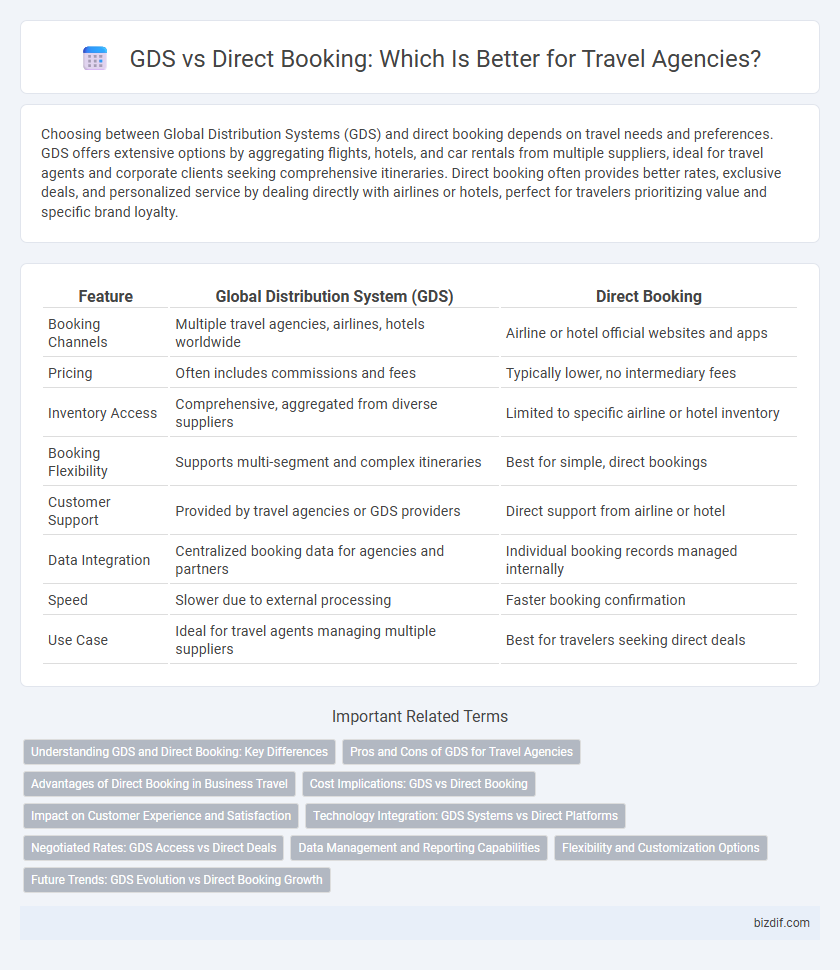Choosing between Global Distribution Systems (GDS) and direct booking depends on travel needs and preferences. GDS offers extensive options by aggregating flights, hotels, and car rentals from multiple suppliers, ideal for travel agents and corporate clients seeking comprehensive itineraries. Direct booking often provides better rates, exclusive deals, and personalized service by dealing directly with airlines or hotels, perfect for travelers prioritizing value and specific brand loyalty.
Table of Comparison
| Feature | Global Distribution System (GDS) | Direct Booking |
|---|---|---|
| Booking Channels | Multiple travel agencies, airlines, hotels worldwide | Airline or hotel official websites and apps |
| Pricing | Often includes commissions and fees | Typically lower, no intermediary fees |
| Inventory Access | Comprehensive, aggregated from diverse suppliers | Limited to specific airline or hotel inventory |
| Booking Flexibility | Supports multi-segment and complex itineraries | Best for simple, direct bookings |
| Customer Support | Provided by travel agencies or GDS providers | Direct support from airline or hotel |
| Data Integration | Centralized booking data for agencies and partners | Individual booking records managed internally |
| Speed | Slower due to external processing | Faster booking confirmation |
| Use Case | Ideal for travel agents managing multiple suppliers | Best for travelers seeking direct deals |
Understanding GDS and Direct Booking: Key Differences
Global Distribution Systems (GDS) aggregate inventory from multiple airlines, hotels, and car rentals, offering travel agents access to a wide range of options in one platform, while direct booking involves customers purchasing services directly from the supplier's website or call center. GDSs provide standardized fare comparison, real-time availability, and consolidated billing, whereas direct booking often offers lower costs, loyalty benefits, and more flexible cancellation policies. Understanding these differences helps travelers and agents choose the optimal booking channel based on convenience, price sensitivity, and service preferences.
Pros and Cons of GDS for Travel Agencies
Global Distribution Systems (GDS) provide travel agencies with extensive access to multiple airlines, hotels, and car rental services, enabling comprehensive itinerary options for clients. However, GDS bookings often incur higher commission fees and less flexible cancellation policies compared to direct bookings. Despite these drawbacks, GDS platforms streamline inventory management and offer real-time availability, making them essential tools for agencies handling diverse travel requests.
Advantages of Direct Booking in Business Travel
Direct booking in business travel offers enhanced control over travel itineraries and greater customization to meet corporate policies. It eliminates intermediary fees often charged by GDS, resulting in cost savings for companies. Real-time updates and direct communication with service providers improve flexibility and responsiveness for frequent business travelers.
Cost Implications: GDS vs Direct Booking
Travel agencies face significant cost implications when choosing between Global Distribution Systems (GDS) and direct booking channels. GDS often involves higher fees and commissions, increasing overall travel package costs, while direct booking typically reduces overhead by eliminating intermediary charges. This cost difference impacts pricing strategies and profit margins for agencies managing hotel, flight, and car rental reservations.
Impact on Customer Experience and Satisfaction
Booking through a Global Distribution System (GDS) offers travelers access to a wide range of options and competitive prices, enhancing convenience and choice. Direct booking with hotels or airlines often provides personalized service, exclusive deals, and greater flexibility in modifications or cancellations, improving overall satisfaction. Customer experience is significantly influenced by the ease of transaction, transparency, and the level of support available, making direct booking a preferred option for travelers seeking tailored interactions.
Technology Integration: GDS Systems vs Direct Platforms
Global Distribution Systems (GDS) integrate multiple travel suppliers into a single platform, enabling travel agencies to access real-time inventories from airlines, hotels, and car rentals with automated booking and ticketing capabilities. Direct booking platforms often offer seamless technology integration with supplier-specific systems, providing immediate availability and tailored user experiences through APIs but may lack the extensive inventory breadth of GDS. The choice between GDS and direct platforms hinges on balancing comprehensive access to diverse travel options against specialized, real-time supplier connectivity optimized for specific markets.
Negotiated Rates: GDS Access vs Direct Deals
Travel agencies benefit from negotiated rates through Global Distribution Systems (GDS) by accessing a broad inventory of discounted fares from multiple suppliers, often secured via long-term contracts. Direct booking with suppliers may offer exclusive deals or last-minute promotions tailored to specific customer segments, but might lack the comprehensive price comparisons available on GDS platforms. Leveraging GDS access enhances pricing transparency and allows travel agents to provide competitive, negotiated rates efficiently, while direct deals enable customized offerings aligned with supplier partnerships.
Data Management and Reporting Capabilities
GDS platforms aggregate vast amounts of travel data from multiple sources, enabling comprehensive reporting and detailed analytics that support strategic decision-making for travel agencies. Direct booking systems offer more granular control over customer data, allowing personalized marketing and tailored service delivery based on individual booking patterns. Effective data management through GDS enhances market visibility, while direct bookings contribute to deeper insights into customer behavior and preferences.
Flexibility and Customization Options
GDS (Global Distribution Systems) offer standardized travel packages with limited flexibility compared to direct booking platforms, which provide travelers the ability to customize itineraries according to personal preferences. Direct booking enables real-time modifications and personalized services, enhancing the overall user experience for complex or unique travel plans. Travel agencies benefit from offering direct booking options to meet diverse customer needs and increase satisfaction through tailored travel solutions.
Future Trends: GDS Evolution vs Direct Booking Growth
Global Distribution Systems (GDS) continue evolving with AI-driven personalization and blockchain integration, enhancing inventory management and real-time data accuracy for travel agencies. Meanwhile, direct bookings gain momentum through mobile app innovations and loyalty program expansions that improve customer experience and reduce commission costs. The future landscape favors a hybrid model where advanced GDS platforms coexist with seamless direct booking channels, optimizing revenue and traveler engagement.
GDS vs Direct booking Infographic

 bizdif.com
bizdif.com